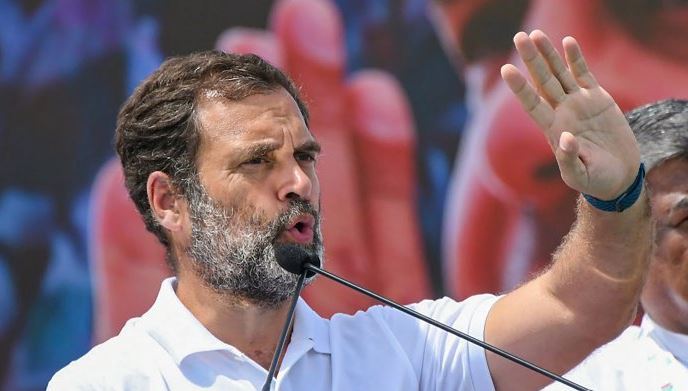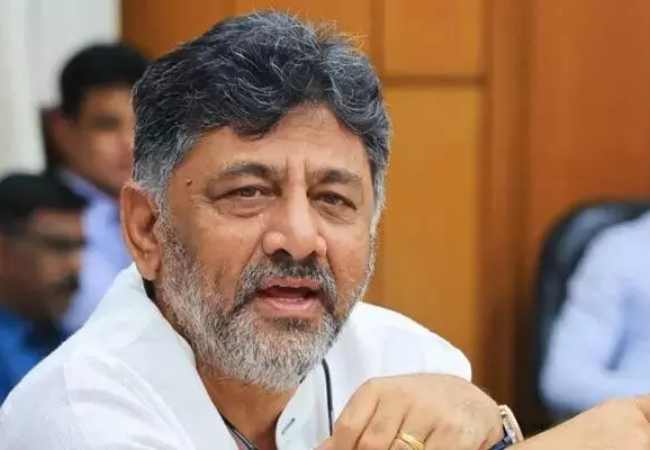New Delhi (PTI): Congress leader Rahul Gandhi on Tuesday alleged that eligible candidates from SC, ST, and OBC communities were being deliberately declared 'not found suitable' to keep them away from education and leadership.
Gandhi made the remark in a post on X, sharing a video of his recent interaction with students of the Delhi University Students Union (DUSU)."
"'Not Found Suitable' is the new Manuvaad now. Eligible candidates from SC/ST/OBC are being deliberately declared 'unsuitable' so that they are kept away from education and leadership," the Leader of Opposition in the Lok Sabha said in his post in Hindi.
'Manuvaad' is the ethos of a society governed by Manusmriti.
Gandhi quoted B R Ambedkar to hail education as the biggest weapon for equality, and accused the Narendra Modi-led Union government and the RSS of subverting this power.
"... the Modi government is busy blunting that weapon," he said.
Gandhi said that more than 60 per cent of the reserved posts of Professor and more than 30 per cent of the reserved posts of Associate Professor have been kept vacant by using the 'Not Found Suitable (NFS)' mechanism.
"This is no exception – the same conspiracy is going on everywhere, IITs, Central Universities. NFS is an attack on the Constitution. NFS is a betrayal of social justice," he said.
The former Congress president said getting reservation was a matter of fighting for rights, respect, and participation.
"I spoke to the students of DUSU, now we all together will answer every anti-reservation move of BJP/RSS with the power of the Constitution," he said.
In the video, Gandhi is heard telling the students that the Hindutva project's foundation is to erase the history of the SCs, STs, and OBCs.
"Why is 90 per cent's history not in our books? Why is only 10 per cent's history in our books? Why is it not written, for example, in our history books that for 3,000 years, Dalits have been treated like dirt, have not been respected, have not been given any space in our society?" he says during the interaction.
On May 22, the DU objected to Gandhi's unannounced visit to its North Campus, calling it a breach of institutional protocol and a disruption of student governance operations.
"Shri Rahul Gandhi has done this for the second time... coming to the university without any intimation and information to University of Delhi," the proctor's office had said in an official release.
That day, Gandhi interacted with students belonging to Scheduled Castes, Scheduled Tribes, and Other Backward Classes on the North Campus.
The session was held at the office of the DUSU president, who belongs to NSUI, a Congress-affiliated outfit.
Let the Truth be known. If you read VB and like VB, please be a VB Supporter and Help us deliver the Truth to one and all.
Bengaluru (PTI): Karnataka has proposed a new Information Technology Policy for 2025–2030, offering extensive financial and non-financial incentives aimed at accelerating investments, strengthening innovation and expanding the state's tech footprint beyond Bengaluru.
The Karnataka Cabinet gave its nod to the policy 2025–2030 with an outlay of Rs 445.50 crore on Thursday after the Finance Department accorded its approval.
The policy introduces 16 incentives across five enabler categories, nine of which are entirely new, with a distinctive push to support companies setting up or expanding in emerging cities.
Alongside financial support, the government is also offering labour-law relaxations, round-the-clock operational permissions and industry-ready human capital programmes to make Karnataka a globally competitive 'AI-native' destination.
According to the policy, units located outside Bengaluru will gain access to a wide suite of benefits, including research and development and IP creation incentives, internship reimbursements, talent relocation support and recruitment assistance.
The benefits also include EPF reimbursement, faculty development support, rental assistance, certification subsidies, electricity tariff rebates, property tax reimbursement, telecom infrastructure support, and assistance for events and conferences.
Bengaluru Urban will receive a focused set of six research and development and talent-oriented incentives, while Indian Global Capability Centres (GCCs) operating in the state will be brought under the incentive net.
Incentive caps and eligibility thresholds have been raised, and the policy prioritises growth-focused investments for both new and expanding units.
Beyond incentives, the government focuses on infrastructure and innovation interventions.
A flagship proposal in the policy is the creation of Techniverse -- integrated, technology-enabled enclaves developed through a public-private partnership model inside future Global Innovation Districts.
These campuses will offer plug-and-play facilities, artificial intelligence and machine learning and cybersecurity labs, advanced testbeds, experience centres, and disaster-resistant command centres.
There will also be a Statewide Digital Hub Grid and a Global Test Bed Infrastructure Network, linking public and private research and development, and innovation facilities across Karnataka.
The government has proposed a Women Global Tech Missions Fellowship for 1,000 mid-career women technologists, an IT Talent Return Programme to absorb experienced professionals returning from abroad, and broad-based skill and faculty development reimbursements.
Shared corporate transport routes in Bengaluru and tier-two cities will be designed with Bengaluru Metropolitan Transport Corporation and other transport entities to support worker mobility.
The government said the policy is the outcome of an extensive research and consultation process involving TCS, Infosys, Wipro, IBM, HCL, Tech Mahindra, Cognizant, HP, Google, Accenture and NASSCOM, along with sector experts and stakeholder groups.
It estimates an outlay of Rs 967.12 crore over five years, comprising Rs 754.62 crore for incentives and Rs 212.50 crore for interventions such as Techniverse campuses, digital grid development, global outreach missions and talent programmes.





